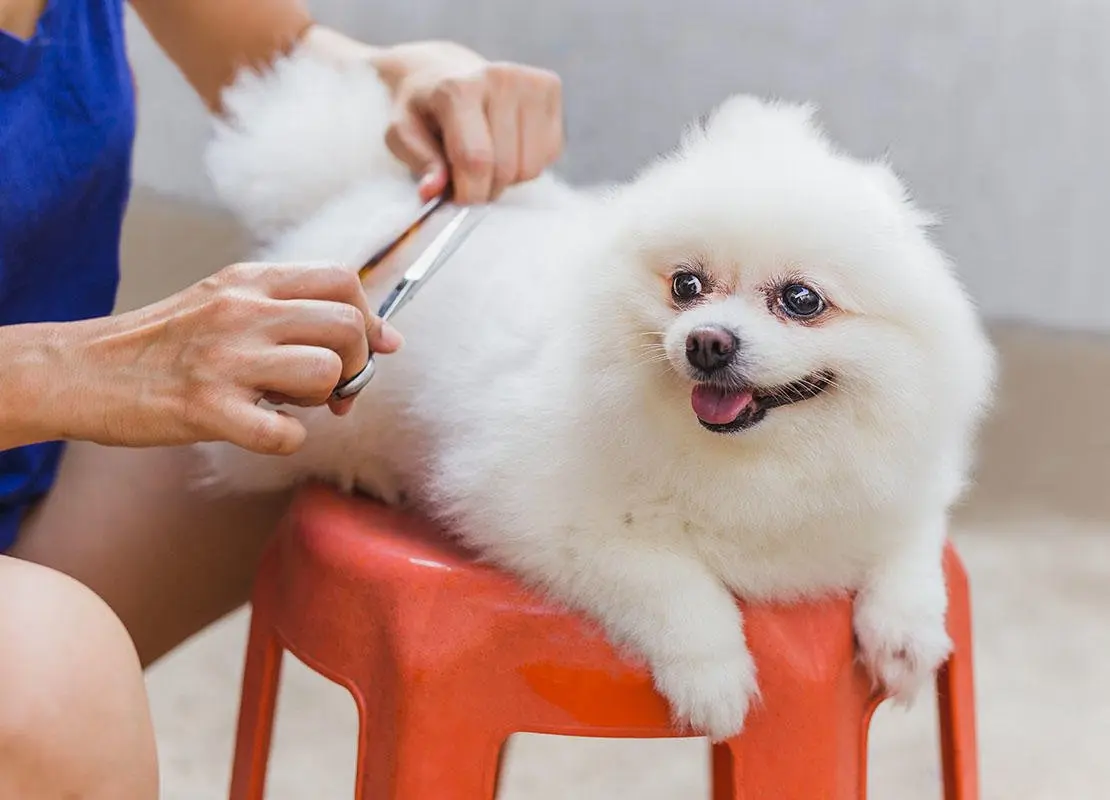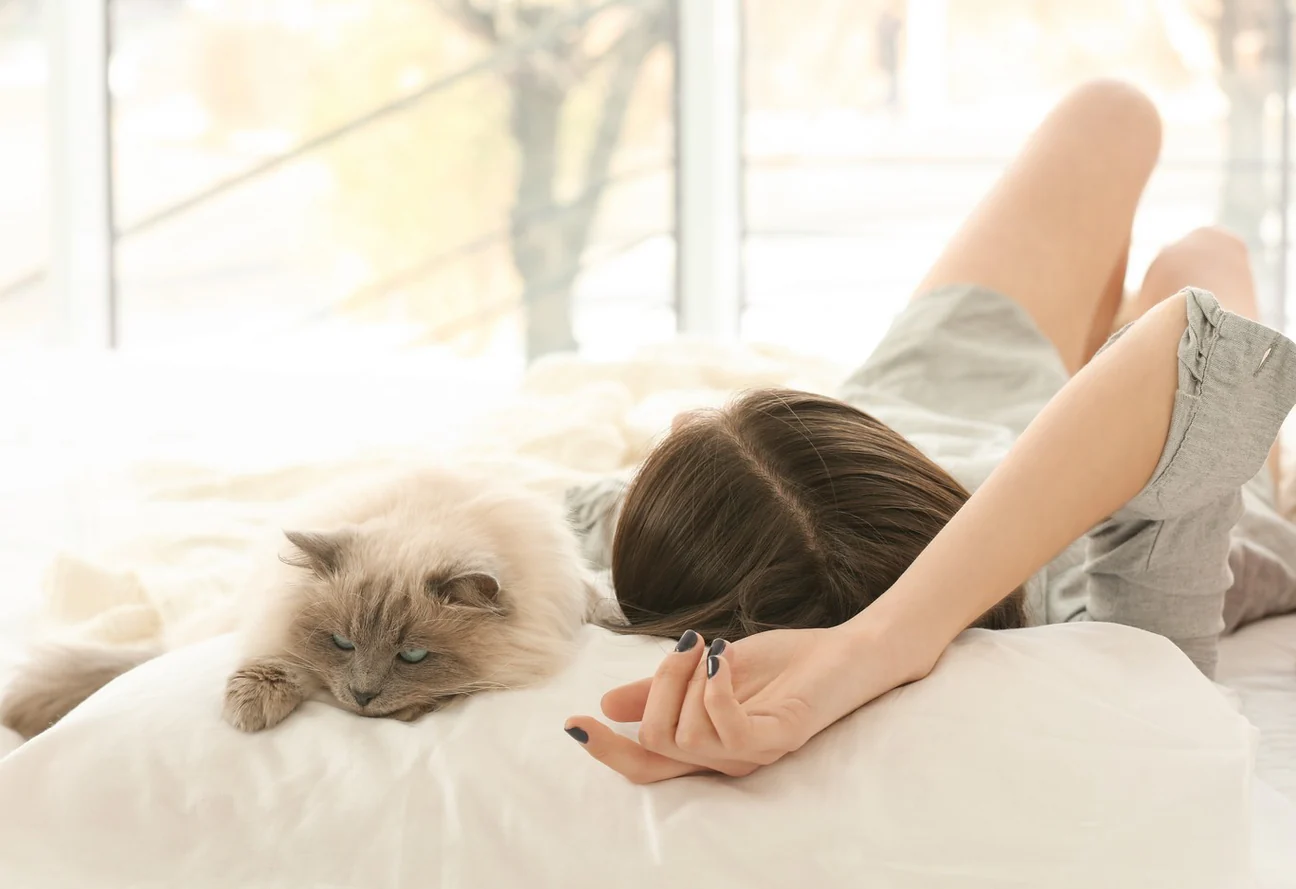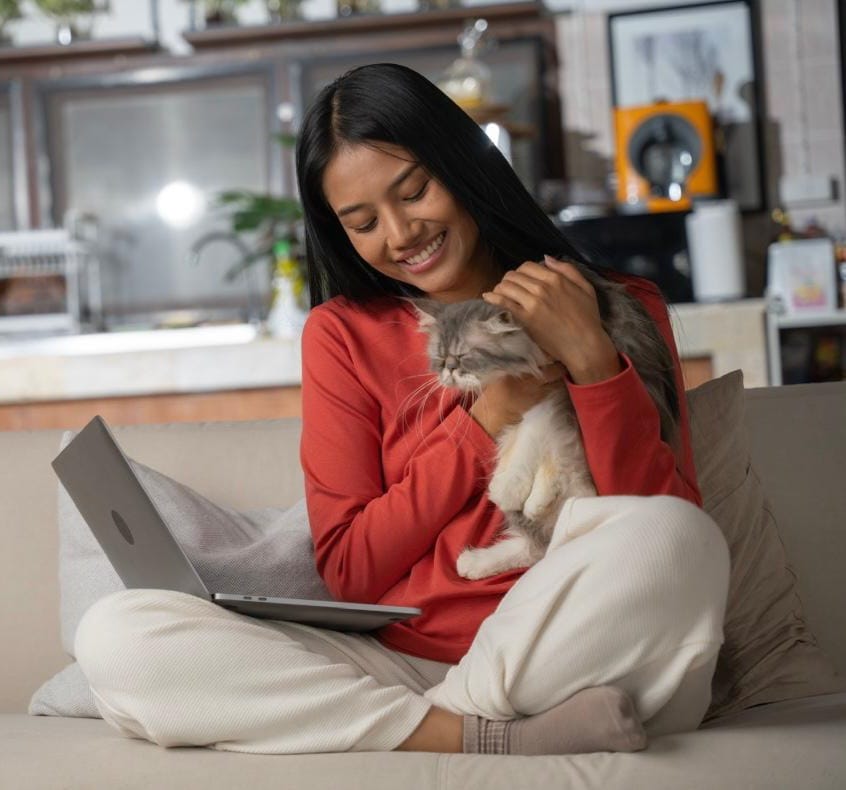Table of Contents
Table of Contents
If you've ever woken up with your cat curled up right above your head, you're not alone. Many cat owners wonder, "Why does my cat sleep by my head?" or even, "Why does my cat sleep by my head every night?" While it might seem like an odd behavior, this nightly ritual actually says a lot about your cat's instincts, emotional bond, and sense of security.
Cats are mysterious, affectionate, and deeply connected to their environment, especially to the people they trust most. From seeking warmth and comfort to expressing love and protection, your cat's choice of sleeping above your head is rooted in feline behavior and biology.
In this article, Dr. Mickey Moppin, DVM, a licensed veterinarian at Telavets, explains the possible reasons behind this behavior and whether it's a sign of affection, comfort, or something more instinctual. You'll also learn the benefits (and potential drawbacks) of letting your cat sleep near your head plus expert tips to gently change this habit if it's affecting your rest.
By understanding your cat's sleeping habits, you can strengthen your bond and create a healthy, comfortable environment for both of you.
Why Does My Cat Sleep Above My Head?
If your cat insists on sleeping right above your head no matter how many times you move them it's not random. Cats are creatures of comfort and instinct, and their sleeping positions often reflect how safe and connected they feel to you. According to Dr. Mickey Moppin, DVM, here are the five most common behavioral reasons behind this adorable (and sometimes puzzling) habit:
1. Seeking Warmth
Cats love warmth it's one of the main reasons they curl up on soft blankets, sunny windowsills, or even your laptop. Your head releases steady body heat throughout the night, making it an ideal spot for your cat to stay cozy. Especially in cooler months, your pillow can become their favorite warm retreat.
2. Comforted by Your Scent
Your scent is deeply familiar and soothing to your cat. Sleeping by your head allows them to surround themselves with the smell they associate with safety and affection. It's their way of feeling close to you, even while resting similar to how kittens snuggle near their mother for comfort.
3. Feeling Safe and Secure
Cats are both predators and prey by nature, which makes them cautious sleepers. By staying close to your head, they position themselves near a trusted protector, you. This spot gives them a sense of security and helps them relax, especially if they're anxious or still adjusting to your home environment.
4. Showing Affection and Bonding
When your cat sleeps near your head, it's often a sign of love. Cats express affection through proximity. Curling up by your head is one of their most genuine ways of showing trust and attachment it's their subtle way of saying, "You're my person."
5. Stress or Separation Anxiety
In some cases, sleeping close to your head may indicate emotional dependence or anxiety. If your cat follows you constantly, meows excessively when you leave, or insists on sleeping right above you every night, they may be dealing with separation anxiety. Creating a calm bedtime routine and giving them a cozy, alternative sleeping space can help.
What It Says About Your Relationship
When your cat chooses to sleep above or near your head, it's more than just a quirky habit, it's a reflection of a deep bond and mutual trust. Cats are instinctively cautious creatures. By sleeping so close to your most vulnerable area your head and face, they're showing that they feel completely safe in your presence.
From a behavioral perspective, this is a sign of affection and emotional connection. Cats that share strong bonds with their owners often display other attachment behaviors such as kneading, purring, grooming your hair or face, or following you from room to room. These actions are part of their natural bonding instincts, similar to how they behave with other cats they trust in a colony.
According to Dr. Mickey Moppin, DVM, "When a cat chooses to sleep near your head, it's expressing a sense of security and familiarity. It means you've become part of its safe space something every cat values deeply."
In short, if your cat curls up by your head every night, take it as a sign of love and reassurance. It's your cat's way of saying, "You're my person."
Is It Okay to Let My Cat Sleep Near My Head?
Allowing your cat to sleep near your head can have both emotional and practical pros and cons. Understanding them can help you decide what’s best for your health and your pet's comfort.
Pros
1. Comfort and Emotional Bonding:
Sleeping near your cat can strengthen the emotional connection between you both. The soft purring sound can be soothing, and many pet owners find it helps them relax and fall asleep faster.
2. Reduced Anxiety (for both cat and owner):
Cats prone to separation anxiety feel calmer when they're close to their owners. Likewise, many people find comfort in their cat's presence especially after a long or stressful day.
3. Temperature Regulation:
Your cat might act like a natural heater, especially in cooler weather. Their body warmth can make bedtime cozy and comforting.
Cons
1. Allergies and Hygiene Concerns:
If you're allergic to dander, allowing your cat near your face or pillow can trigger sneezing, congestion, or itchy eyes. Even if your cat is clean, fur and allergens can transfer easily to your bedding.
2. Sleep Disruption:
Cats are naturally active during dawn and dusk. Your cat may shift, knead, or groom itself during the night, which can interrupt your sleep cycle.
3. Health and Safety Considerations:
While rare, close sleeping proximity can increase the risk of accidental scratches, hair inhalation, or exposure to litter residue if your cat isn't well groomed before bedtime.
Dr. Moppin recommends maintaining good hygiene practices such as regular grooming, washing bedding often, and keeping your cat's litter area clean to safely enjoy these bonding moments without compromising your sleep quality or health.
Signs Your Cat Loves You (Beyond Sleeping on Your Head)
While sleeping near your head is one of the most intimate signs of affection, cats express love and trust in several subtle ways. Understanding these behaviors can help you better interpret your cat's emotional connection with you.
1. Slow Blinking
If your cat looks at you and blinks slowly, consider it a feline "I love you." In cat communication, slow blinking indicates deep trust and relaxation. Cats rarely close their eyes around anyone they don't feel safe with. You can even strengthen your bond by returning the gesture slowly blinking back to show that you feel the same.
Dr. Mickey Moppin, DVM explains: "When a cat blinks slowly at you, it's a sign that they see you as a trusted companion, not a threat. It's one of the most genuine displays of affection a cat can offer."
2. Headbutting (Bunting)
When your cat gently bumps their head against your hand or face, it's not just a playful nudge. This action, called bunting, is how cats mark you with their scent glands to claim you as part of their social group. It's their way of saying, "You belong to me."
3. Purring Near You
While cats can purr for various reasons including self soothing, purring in your presence often signals comfort and attachment. If your cat purrs while sitting on your lap or lying by your pillow, it means they associate you with safety and warmth.
4. Showing Their Belly
In the feline world, showing the belly is the ultimate display of trust. It's the most vulnerable part of a cat's body, and exposing it means your cat feels completely secure around you. However, it's important to note that not every cat wants belly rubs sometimes it's simply a sign of comfort, not an invitation to touch.
Each of these affectionate gestures from slow blinking to gentle purring, reveals your cat's emotional bond and confidence in your relationship. Recognizing and responding to these behaviors helps build mutual trust and strengthens your lifelong connection.
FAQs
Why does my cat sleep above my head every night?
Cats are naturally drawn to warmth, security, and familiar scents. Your head provides consistent heat and your scent is strongest there, which makes it comforting for your cat. If your cat repeats this behavior nightly, it's a sign of strong trust and emotional bonding rather than random habit.
Is it safe to sleep with my cat?
In most cases, yes if both you and your cat are healthy. Allowing your cat to sleep near your head can strengthen your bond and provide emotional comfort. However, Dr. Mickey Moppin, DVM notes that cat owners with allergies, asthma, or compromised immunity should take precautions. Regular grooming, washing bedding, and maintaining flea control help ensure a clean and safe sleeping environment.
Should I worry if my cat suddenly starts doing this?
A sudden change in sleep behavior can sometimes signal stress, anxiety, or illness. If your cat begins sleeping by your head out of nowhere, it could be seeking reassurance or feeling unwell. Pay attention to other signs like changes in appetite, grooming, or vocalization. If these occur, schedule a veterinary consultation for a checkup.
How do I stop this habit?
If you'd prefer your cat not to sleep near your head, provide alternative cozy spots. Set up a soft bed near your pillow or at the foot of your bed and reward your cat for using it. You can also use calming sprays or pheromone diffusers to make those spaces more inviting. Avoid scolding cats respond better to gentle redirection than punishment.
Conclusion
Your cat sleeping near your head isn't just a quirky habit it's a display of trust, comfort, and deep affection. From warmth seeking behavior to emotional bonding, this nightly ritual reflects how much your feline companion values your presence.
While it's usually harmless and endearing, it's always good to stay alert to sudden changes in your cat's sleep patterns. These could indicate stress or a medical concern that deserves attention.
If your cat's sleep behavior changes suddenly or they seem anxious, book a vet consult online at Telavets
. Our licensed veterinarians, including Dr. Mickey Moppin, DVM, are available to help you understand and support your cat's wellbeing all from the comfort of home.
Related Articles

NexGard Plus for Dogs: Side Effects, Benefits, Dosage & Expert Reviews
Learn everything about NexGard Plus for dogs, including benefits, side effects, dosage, and real veterinary reviews. Ensure your dog stays protected from fleas, ticks, and parasites.

Pet Benefits Programs for Employees: How Companies Are Supporting Pet Parents with Virtual Vet Care
Discover how pet benefits programs help companies attract and retain employees. Learn how TelaVets offers virtual vet care as a modern employee pet benefit.

Dog Grooming Tips for Beginners: How to Groom Your Dog at Home | TelaVets
Discover beginner-friendly dog grooming tips to keep your dog healthy, clean, and happy. Learn how to groom at home, make it fun, and know when to seek professional advice.

